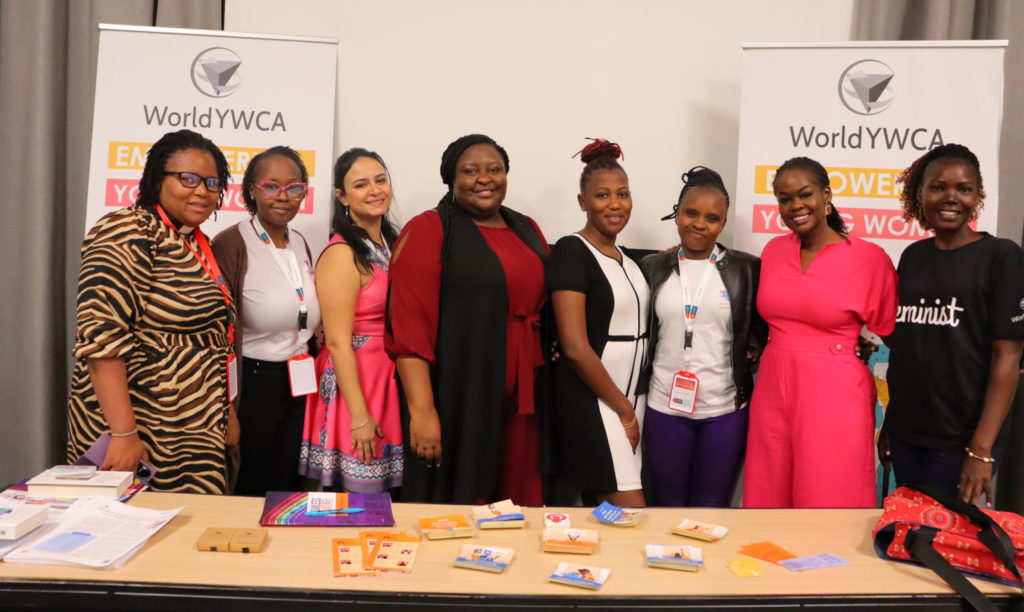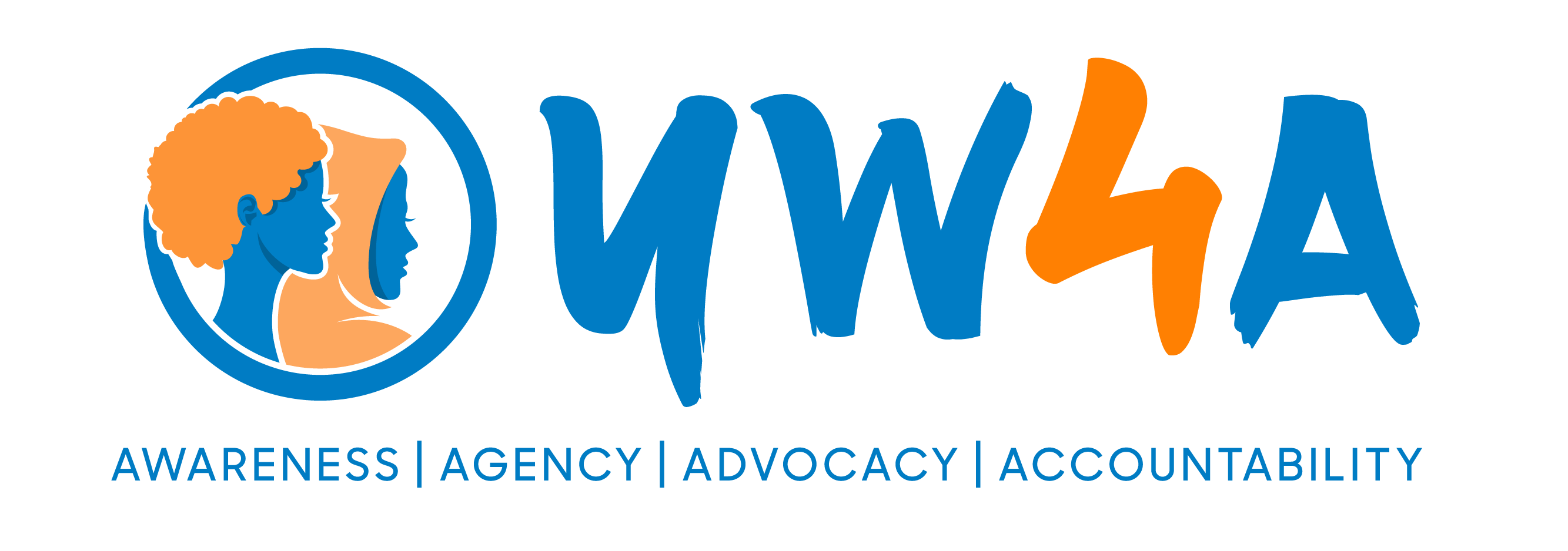In a roundtable discussion held at the recently ended Faith Change-makers 2023 Inter-religious Convention, held in South Africa, the World YWCA facilitated a thought-provoking discussion at the crossroads of faith and feminism.
Under the theme “Harmonizing Faith and Feminism: Facilitating Change with Transformative Tools,” the session showcased two World YWCA tools at the forefront of gender transformative programming and research – the RiseUp! Young Women’s Leadership Training Manual and the Feminist Consultation Methodology. These tools are also central to the implementation and success of the Young Women for Awareness, Agency, Advocacy, and Accountability (YW4A) initiative’s Pathway 2.

The RiseUp! Transformative Leadership model empowers young women by nurturing their strengths, facilitating decision-making, and encouraging confidence, knowledge, skills, and support. World YWCA’s vision of transformative leadership integrates knowledge, skills, and feminist values to reshape power dynamics at personal and societal levels.
In stark contrast to traditional research methods, the Feminist Consultation Methodology (FCM)’s core principles are in engaging participants as co-researchers, emphasizing community-led data collection and analysis, and supporting intergenerational knowledge sharing. The FCM serves as a catalyst for transformative justice, rooted in diversity, democracy, and local knowledge.
The discussion at the Convention provided a platform for diverse voices, including religious leaders, gender champions, and development practitioners to explore the opportunities and limitations provided by these tools within faith and faith-inspired institutions, with tangible action plans.


The two-hour allocation for the session proved insufficient, given the fascinating perspectives shared and the provocative questions from the audience. This led to an extension of the dialogue in an ad hoc fireside chat that was then convened the following day to continue the discussions, allowing participants to delve further into the practical applications of the tools discussed and explore opportunities and challenges.
During the follow-up session, participants actively engaged in spirited discussions, putting theoretical concepts into practical contexts. Workgroups were formed to explore how to effectively apply the tools in current initiatives within their respective communities and institutions.


Insights from the round table discussion and fireside chat
The sessions allowed for candid conversation, collective brainstorming, identifying potential obstacles, and proposing solutions to the effective harmonization of faith and feminism through the tools, reinforcing the Convention’s commitment to finding actionable steps toward interreligious understanding.
- Young Women Empowerment through RiseUp! Leadership Training
One of the noteworthy points of discussions centred on the significance of the RiseUp! methodology in cultivating practical leadership skills among young women. Participants emphasized the need to integrate an interfaith approach, recognizing its role in fostering a deeper understanding of different faiths among the youth. Creating a safe space for interreligious dialogue emerged as a crucial aspect, with suggestions on guiding these conversations.


- Expanding Age Limits and Developing Pre-Youth Resources
A notable proposal during the dialogue was to reconsider the age limits for young women participating in leadership programmes. The idea of extending the age range from 15 to 30, to 15 to 35 gained traction. Additionally, there was a call for the development of a pre-youth manual tailored for pre-teens aged 11 to 14. This manual, with age-appropriate content, aims to instil leadership skills at an earlier age, recognizing the importance of early empowerment.
- Inclusion of Young Men and Positive Masculinities
To address gender dynamics, participants emphasized the necessity of implementing RiseUp! for young men, ensuring a balanced approach to empowerment. The conversation evolved into a broader discussion on promoting positive masculinities, emphasizing collaboration and equality to prevent power imbalances between genders. This inclusive perspective aims to build harmonious relationships and prevent conflicts arising from perceived gender disparities.
- Artistic Tools for Enhanced Understanding
The discussions highlighted the potential of artistic tools in enhancing the understandability of religious perspectives and practical skills. Incorporating creative approaches into training can provide innovative ways to address issues rooted in faith, with references to scriptures and community guidance. This intersection of art and leadership training was recognized as a valuable avenue for effective communication and skill development.


- The RiseUp! Manual as a Catalyst for Interfaith Dialogue
Acknowledging the inherent limitations of any manual to encompass all religions, the participants highlighted that the RiseUp! manual serves as a starting point for conversation rather than a definitive guide. The emphasis is on empowering young women with the foundational knowledge to engage with others, nurturing a sense of familiarity with the broader human family and the diversity of beliefs and belief systems.
- Promoting Understanding Across Insular Communities
Recognizing that many communities tend to be insular, the RiseUp! training can break down these barriers. By equipping young women with the tools to understand and appreciate diverse perspectives, the manual becomes a catalyst for initiating conversations across cultural and religious boundaries. This approach is particularly relevant in regions like South Africa, where religious diversity is a reality.
An important aspect of the discussion centred on the role of the Golden Rule as a unifying principle in the curriculum. Mandating the learning about different religions in South Africa is framed by the idea that, as long as it adheres to the Golden Rule – encouraging kindness to one another – it becomes a shared foundation that transcends individual beliefs. This approach advances an environment of respect and understanding, essential for building bridges in a diverse society.
The strength of the RiseUp! leadership training lies in its universal approach to the Golden Rule, transcending religious boundaries. Whether participants are from Muslim, Christian, Baha’i, traditional, Hindu, Sikh, or any other religious community, the Golden Rule serves as a common thread, fostering inclusivity and shared values under the YW4A programme.
- Faith as a Strong Component and Reference Point in addressing SGBV


RiseUp!, particularly under the YW4A programme, demonstrates a commitment to inclusivity by working with diverse religious communities. The programme’s initial mapping of different religions ensures that the content is tailored to address the specific needs and contexts of young women from various faith backgrounds. Understanding the importance of faith within communities, RiseUp! can incorporate scriptures as reference points in addressing specific situations and issues to do with SGBV. This approach not only resonates with the religious beliefs of participants but also facilitates meaningful dialogue with community leaders and institutions.
- Integration of Legal and Policy Frameworks
The adaptability of the RiseUp! Leadership model is evident in the four programme countries, where YW4A has responded to the specific needs of young women by adding an extra session to the training. This session focuses on legal and policy frameworks, emphasizing the participation and leadership of young women in political processes. By addressing these aspects, the programme ensures that young women are not only equipped with practical skills but also have a nuanced understanding of the legal landscape, empowering them to navigate and advocate for their rights effectively.


Practical Applications of Feminist Consultation Methodology (FCM)
It was shared that the FCM can be valuable tool with diverse practical applications, for sustainability and community engagement. The YWCA of South Africa explored the integration of FCM into youth-led activities within Technical and Vocational Education and Training (TVET). Young leaders can use FCM to identify issues, and gaps, and collaboratively find solutions, providing a structured approach to addressing challenges.
A representative from the Baha’i community shared experiences with service projects for 12 to 15-year-old children. She explored the use of FCM as a solution to make these projects more engaging and sustainable. By intentionally identifying appropriate activities and stakeholders, FCM’s intentional and systematic approach can facilitate engagement for young people in practical solution development. Events and conferences can be energizers and fellowship events, emphasizing the need for sustained impact and involvement in ongoing work through the use of FCM.
Acknowledging the necessity for sustainability, participants emphasized the importance of young women taking the lead in incorporating FCM into ongoing work. This requires creating awareness of participatory methodologies within communities, involving faith leaders in data collection, and garnering community support.


- Collaboration and Navigating Terminology with Faith Leaders
Recognizing the significance of involving faith leaders, the consultation highlighted the need to consult with them during the validation of results and data collection. This collaborative approach ensures a comprehensive understanding of issues from the perspective of young women, fostering support and inclusivity.
It was also acknowledged that the success of FCM relies on community support and sufficient resources. To incorporate FCM into research and development, there is a call for supporting resources and community awareness around participatory methodologies. This ensures the effectiveness and sustainability of FCM in addressing the unique needs of young women.
The discussion shed light on the nuanced challenges of using academic terminology in the FCM, particularly in the context of faith-based organizations. The acknowledgment that faith-based organizations may find terms like “feminist” and “positive masculinities” intimidating highlights the need for careful preparation and bridging the gap in understanding. Recognizing the complexities, especially in contexts like Egypt, where decisions are often made by church leaders, programmes such as YW4A are positioned as seeds for understanding. The aim is to gradually introduce and foster comprehension of methodologies like FCM, which may be perceived as progressive, especially when compared to traditional research approaches.
- The Baha’i Perspective on FCM
A participant from the from the Baha’i faith interrogated the relatability of FCM to their principles of consultation and equality. In the Baha’i perspective, consultation is viewed as a spiritual principle, emphasizing the capacity of individuals to independently investigate the truth. The collective community-based process, devoid of hierarchical energy, aligns with fundamental Baha’i teachings.


Baha’i principles emphasize a collective, community-based process where everyone contributes ideas to find solutions that work for all. This aligns with the Baha’i belief in experience sharing at the centre, creating a safe space for open dialogue. The cyclical process of consultation, action, and reflection forms the basis of the research process, fostering continuous improvement. The need to systematically collect information, as emphasized in Baha’i principles, resonates with FCM. The shared belief in reading societal or social reality and translating it into actionable steps aligns with the principles of FCM, making it more acceptable within religious and social contexts.
- Bridging Language and Culture through Terminology Used
The discussion highlighted the intricate challenge of using terms such as feminism and positive masculinities in transformative tools, acknowledging the potential negative connotations and backlash associated with these terms. Feminism, perceived as an import of Western values, is met with resistance in some African communities. It is sometimes linked with movements championing diversity in sexual orientation and gender expression, thereby posing challenges within spaces where these concepts clash with established social orders and beliefs. The fear is that embracing feminism might dismantle established social structures, leading to skepticism and rejection.
The concept of positive masculinities raises questions about the implication that there is a negative counterpart. This perspective leads to resistance, as being masculine is seen as inherently positive, and any suggestion otherwise is met with skepticism. The broader issue of language was discussed, highlighting the lack of understanding when using single-word terms. The discussion emphasized the need to unpack and contextualize these terminologies within local cultures to avoid misinterpretation and exclusivity.
Conclusion


Indeed, the rich discussion at the World YWCA sessions at the Faith Changemakers 2023 Interreligious Convention provided recommendations for adapting transformative tools, like the RiseUp! Manual and FCM, to local contexts. Recognizing the sensitivity of terminology, the need to unpack concepts within local cultures was emphasized. This approach aims to make these tools more accessible and acceptable as they are rolled out in different countries in the YWCA movement and beyond.



